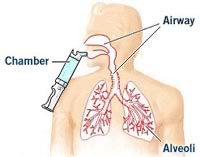 It's recognized that people who are obese have a higher risk for developing type 2 diabetes. Now, researchers reporting in the July 21 issue of Nature have found a link between the two, in the form of a protein - specifically, retinol binding protein 4 (RBP4) - that's secreted by fat cells.
It's recognized that people who are obese have a higher risk for developing type 2 diabetes. Now, researchers reporting in the July 21 issue of Nature have found a link between the two, in the form of a protein - specifically, retinol binding protein 4 (RBP4) - that's secreted by fat cells.RBP4 has a known function as a transporter of Vitamin A in the body. These investigators found that high levels of the protein can also cause cells to be more resistant to insulin - a condition that precedes diabetes.
This knowledge may lead to the development of drugs that can lower levels of this protein, adding to the arsenal of diabetes' therapies.
For a summary of the study:
Study identifies fat-secreted protein linked to insulin resistance
For the study itself:
Serum retinol binding protein 4 contributes to insulin resistance in obesity and type 2 diabetes
 With the warmer temperatures and extended hours of daylight (hours that may become more available if Congress passes its energy bill with the proposed daylight savings extension - a plan to start daylight savings time three weeks earlier and end it a week later), summer is a great time to begin or expand your exercise program.
With the warmer temperatures and extended hours of daylight (hours that may become more available if Congress passes its energy bill with the proposed daylight savings extension - a plan to start daylight savings time three weeks earlier and end it a week later), summer is a great time to begin or expand your exercise program. ... Are getting better and better.
... Are getting better and better. The inhaled insulin used in the study was ExuberaTM, a short-acting, dry powder, human insulin developed in a joint venture by Sanofi-Aventis and Pfizer. The inhalation device (shown) was developed by
The inhaled insulin used in the study was ExuberaTM, a short-acting, dry powder, human insulin developed in a joint venture by Sanofi-Aventis and Pfizer. The inhalation device (shown) was developed by  On June 29, President Bush signed into law the Patient Navigator Outreach and Chronic Disease Prevention Act of 2005.
On June 29, President Bush signed into law the Patient Navigator Outreach and Chronic Disease Prevention Act of 2005. If you're active, watch your diet, and have been successful at maintaining a healthful weight, you may have managed to keep your cholesterol levels under control ... or not. Lifestyle wields control over your cholesterol response but so do your genes. It's quite possible that no matter how hard you work to keep your cholesterol levels down, the influence of your family's genes could thwart it.
If you're active, watch your diet, and have been successful at maintaining a healthful weight, you may have managed to keep your cholesterol levels under control ... or not. Lifestyle wields control over your cholesterol response but so do your genes. It's quite possible that no matter how hard you work to keep your cholesterol levels down, the influence of your family's genes could thwart it. Walking is beneficial for weight loss, but what if that walk is a leisurely stroll?
Walking is beneficial for weight loss, but what if that walk is a leisurely stroll?